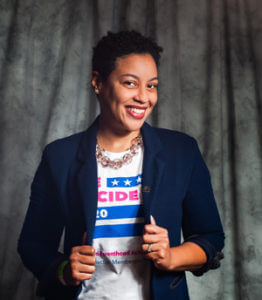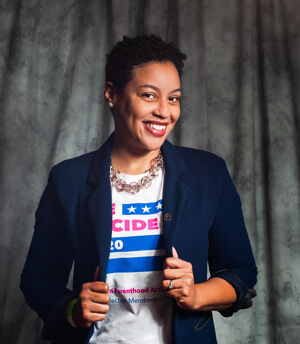An Interview with Melanie Roussell Newman, SVP, Communications, PPFA
Melanie Roussell Newman, Senior Vice President of Communications and Culture at Planned Parenthood Federation of America
Fighter. Connector. Impactful.
LinkedIn
Twitter: @MelanieRNewman
Tell me about your current role?

I’m the senior vice president for communications and culture at Planned Parenthood Federation of America and the Planned Parenthood Action Fund. I run the media relations team, the digital content and campaigns team, and our brand and culture team, which includes marketing, creative and editorial services, corporate strategy, and arts and entertainment and influencers.
So, your team is responsible for Chelsea Handler’s Instagram posts about PPFA?
Basically. We have a deep history of engaging creatives in our work and getting people to use their platforms to tell their own stories and also to promote the work of PPFA if it’s something they believe in.
If there was a soundtrack of greatest hits related to your career, what would make the list?
Truth Hurts by Lizzo because in my work honesty is of high value and everybody doesn’t appreciate it. I’m certain of what my DNA tests would show.
What’s Going On by Marvin Gaye because what is going on, girl? It’s crazy. That song is as relevant today as it ever was.
Can you share an experience in the workplace where you have had to reclaim your time? What was the context? How did you navigate it? What was the outcome?
An instance of reclaiming my time was when I proposed to my boss that he promote me, and he laughed in my face. I had worked to re-elect him while he was under federal investigation at the time, did extra work in the field and on the campaign trail. I returned to Washington, DC and asked to be promoted to chief of staff. He laughed at me and asked why I thought I would be qualified for that role. I noted that I had just come off his campaign and thought I was the right person to continue his career in Congress. He gave me a promotion, but it was not sufficient in my mind. I left to go to the House Judiciary Committee as communications director and that role helped shape the rest of my career. My time in this life is critical and short; I believe in being the most impactful.
What’s your approach to self-care? Are there any rituals you use to survive and thrive?
I am very bad at self-care and think it’s important for us to be honest and own up to it when we are not good at it. I do some things: I work out sometimes. I have a very strong girlfriend network, so I make time to connect with them. I make time to spend with my husband, my child and with myself. This is a space where I need to do better and part of doing better is being honest that I’m currently not good at it.
We come from a resilient and strong lineage. How would you describe the type of ancestor you want to be and why?
The type who provided pathways for others…that not only my child and his children can say I helped to create pathways, but that I did that for friends, friends of friends and people I didn’t know. I think part of that is coming from a political background which is not based on winning, but on knowing people. That framework keeps Black people out of key positions, out of decision-making roles and without access to change policies that impact our lives directly. The more we pull up, pull in, and connect each other, the more access we have. Harriett (Tubman) is a great example, but a cliché one. I want to be the ancestor who created more access to strengthen and impact the lives of Black people.
What advice would you offer other Black women trying to develop or amplify their voice and become self-advocates?
Find partners, friends, peer mentors – not just people who are advanced in their career but at same level in their careers so that you can work together on finding your voice. Practice it. Get with your peers and say I want to ask for a raise, let me practice with you. I do that with my friends. We talk about internal negotiations around salary when folks are getting new jobs and have a new contract. Not only does that provide a feedback mechanism for you, it’s a reminder for those giving the advice to do it themselves.
Have mentors who are advanced in their careers. A feedback loop with peers is helpful and important.
If you could change the social sector in a way that would benefit, lift up, or affirm Black women, what would that change be?
Listen to Black women. It would be the social sector listening. Black women have been promoting concepts like reproductive justice for 25-30 years and people are NOW beginning to accept that. It’s been talked about on the presidential debate stage. Perhaps if the social sector had listened to Black women 25 years ago, access would look different today.


